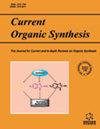针对肝细胞癌的新型双咪唑-噻唑杂环的绿色合成与抗癌活性
IF 1.7
4区 化学
Q3 CHEMISTRY, ORGANIC
引用次数: 0
摘要
背景:鉴于目前化疗的不足,需要更有效的抗癌药物。咪唑和噻唑化合物具有显著的生物活性,是很有前途的候选化合物。目的和目标:本研究以肝癌为重点,研究咪唑和噻唑衍生物的抗癌潜力。目的是合成双咪唑-噻唑杂化物,并评估其作为肝细胞癌抗癌剂的疗效。方法:在 DABCO 催化下,使用 (2,2'-((1,4-亚苯基双(2-巯基-4-甲基-1H-咪唑-1,5-二基))双(乙烷-1-基-1-亚基))双(肼-1-硫代甲酰胺)、肼酰卤和 α-卤代酮合成杂合剂。该方法设计为快速、高产且环保。通过傅立叶变换红外光谱、核磁共振和质谱进行了结构确认。结果:对合成的混合物进行了针对 HepG-2 和 WI-38 细胞系的体外测试。化合物 16b、14a、16a 和 7b 显示出显著的抑制活性,其 IC50 值显示出与标准药物索拉非尼相当或更强的抑制作用。结论双咪唑-噻唑杂交化合物表现出强大的抗癌特性,尤其是对肝细胞癌,使它们成为未来癌症疗法的潜在候选药物。它们对正常 WI-38 人成纤维细胞的作用进一步证明了它们的选择性和安全性。本文章由计算机程序翻译,如有差异,请以英文原文为准。
Green Synthesis and Anticancer Activity of New Bis-Imidazole-Thiazole Hybrids Targeting Hepatocellular Carcinoma
Background: Given the inadequacies of current chemotherapy, there is a need for more effective anticancer agents. Imidazole and thiazole compounds have demonstrated significant biological activity, making them promising candidates. Aims and Objective: This study investigates the anticancer potential of imidazole and thiazole derivatives, focusing on liver cancer. The aim is to synthesize bis-imidazole-thiazole hybrids and evaluate their efficacy as anticancer agents against hepatocellular carcinoma. Methods: The hybrids were synthesized using (2,2'-((1,4-phenylenebis(2-mercapto-4-methyl1H-imidazole-1,5-diyl))bis(ethan-1-yl-1-ylidene))bis(hydrazine-1-carbothioamide), hydrazonoyl halides, and α-halo ketones, catalyzed by DABCO. This method is designed to be fast, yield high amounts of product, and be environmentally friendly. Structural confirmation was provided by FT IR, NMR, and MS spectroscopy. Results: The synthesized hybrids were tested in vitro against HepG-2 and WI-38 cell lines. Compounds 16b, 14a, 16a, and 7b showed significant inhibitory activity, with IC50 values indicating strong inhibition comparable to or better than the standard drug Sorafenib. Conclusion: The bis-imidazole-thiazole hybrids exhibit potent anticancer properties, particularly against hepatocellular carcinoma, making them potential candidates for future cancer therapies. Their selectivity and safety were further demonstrated by their effects on normal WI-38 human fibroblasts.
求助全文
通过发布文献求助,成功后即可免费获取论文全文。
去求助
来源期刊

Current organic synthesis
化学-有机化学
CiteScore
3.40
自引率
5.60%
发文量
86
审稿时长
6-12 weeks
期刊介绍:
Current Organic Synthesis publishes in-depth reviews, original research articles and letter/short communications on all areas of synthetic organic chemistry i.e. asymmetric synthesis, organometallic chemistry, novel synthetic approaches to complex organic molecules, carbohydrates, polymers, protein chemistry, DNA chemistry, supramolecular chemistry, molecular recognition and new synthetic methods in organic chemistry. The frontier reviews provide the current state of knowledge in these fields and are written by experts who are internationally known for their eminent research contributions. The journal is essential reading to all synthetic organic chemists. Current Organic Synthesis should prove to be of great interest to synthetic chemists in academia and industry who wish to keep abreast with recent developments in key fields of organic synthesis.
 求助内容:
求助内容: 应助结果提醒方式:
应助结果提醒方式:


